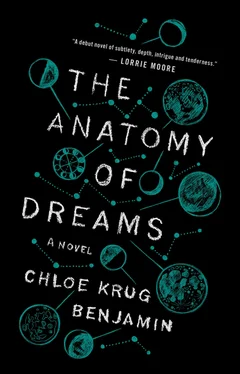“Oh, I can’t complain,” he said. “I have more space than I did in Fort Bragg. Almost as much space as there was in Snake Hollow.”
“Gabe told me you sold it,” I said, though I hoped it wasn’t true.
Keller nodded. “Lot of money to keep up a place like that.”
“It must have been an ordeal to pack it all away.”
“Mostly papers. I was lucky. Much easier to bring everything with you when your most precious possessions are two-dimensional.”
“I suppose so.”
My stomach gurgled. Unlike Gabe, I usually ate before we left for the lab, which had its disadvantages.
“I never thought you’d sell that place,” I said.
“I know.” Keller exhaled, cocking his head. “But we couldn’t have stayed there forever. And who would have lived in the house while we were here?”
“Renters,” I said. “Renters could have lived there.”
“ Renters ,” said Keller. “Nosing around in my library.”
I shook my head, grinning. “Should I get Gabe?”
“He’s back,” said Keller, nodding toward the window, as Gabe entered Room 76 and took his seat by Jamie’s bed.
I watched the polysomnograph closely as Jamie entered his next REM cycle. After eight minutes, I triggered the LEDs.
Keller leaned forward with his elbows on the desk. Another LR signal appeared on the EEG—just one movement again, left-right; we still needed a second one to count it as a sign of lucidity.
“I’m telling you, he’s not lucid,” said Keller.
“Hold on,” I said. “He’s trying.”
There, in the next room, Jamie’s head was slowly rotating from left to right, as if charting the progress of a plane. He turned fully to one side, setting his ear down on the pillow, before going the other way again.
“Well, it’s some kind of left-right signal,” I said.
“Just not the one we’re looking for,” said Keller.
“Wait a little longer. I think we may have something.”
Jamie’s movements were speeding up. He turned his head from left to right more quickly now, and I stood over the EEG, convinced he was working up to an eye signal. But then he began to move faster, so fast his head was slapping at the pillow before bucking the other way, and his legs began to shake.
“Adrian,” I said, “I think he’s seizing.”
Such a lot of movement for a little body—Jamie’s legs strained at the straps, then his hips and arms, his breath rising in shallow bursts. Gabe was out of his chair now, standing next to the bed. Jamie had wriggled his burned arm out of the straps, and he scratched at Gabe’s face. The last two fingers barely grazed him, but Jamie’s pointer finger scraped Gabe’s eyelid.
“He isn’t seizing,” said Keller, pushing back from the desk. “He’s trying to get out of the bed. Stay here.”
Keller strode out of the room and reemerged in Room 76, where he ran to the bed and took hold of Jamie’s head. I put on the headphones that hooked up to 76’s audio system just as a voice came through.
“He said he sees her,” said Gabe to Keller. I could see his mouth moving, but the sound came through with a second’s delay.
“I’m sure he does.” Keller was facing away from me, but I knew his voice. “Get ahold of his limbs.”
“Some help would be nice,” Gabe said as Jamie snuck his left leg out from under the strap and sent a flexed-foot kick at Gabe’s neck.
“I have to keep his head steady,” said Keller.
I began to take the headphones off, ready to join them, but Keller looked at the window as if he could see through it.
“Sylvie,” he said, “I need you there.”
“Why?” I asked, though I knew it was pointless—he couldn’t hear me in the other room. I felt useless and sick, watching through the window as Jamie writhed and hollered—he was strong in the committed way that children are strong, using every muscle he could. But I stayed where I was, afraid to go against orders.
“Ma!” yelled Jamie.
The mask was still on his face; he reached for it with his left hand, but Gabe was too quick. He grabbed the arm and held it back down to the bed.
“Sylvie, send the light stimulus,” said Keller, one hand at the top of Jamie’s head, the other at his chin. “Respond to him, Gabe. Try to calm him.”
I triggered the LEDs, and Jamie’s body paused in notice.
“Where?” asked Gabe. “Where’s your ma?”
“There are so many stars,” said Jamie, his body tensing.
“That’s right,” said Gabe. “Do you remember what to do when you see stars?”
“At the window,” said Jamie. “I see her.”
Gabe looked at the window in Room 76, closed and barred as usual.
“What’s she doing?” asked Gabe.
“Climbing out,” said Jamie. “I lost her at the—supermarket.”
The mask had fallen halfway off his face, dangling over one eye. The exposed eye was still closed.
“At the supermarket?” Gabe asked, looking at Keller.
“No,” said Jamie. “We were—riding—on the train—”
The shaking began again, more violently than before, and Jamie screamed. His heart rate had skyrocketed, and the underarms of his pajamas were soaked in sweat. Keller strained to keep the boy’s head steady. He looked at the window between our rooms.
“Sylvie,” he said, “we need a current. Send it through F3 and F4.”
These were the electrodes attached to Jamie’s frontal lobe. I shook my head, though I knew he couldn’t see me. A current to the frontal lobe—this was an electrical shock, which would result in a real seizure, brief but shocking enough to wake Jamie up. I had been taught how to do it, but I’d never tried it on a patient.
“Sylvie,” Keller barked, his teeth gritted. I stood over the machines. The paper from the analog polysomnograph moved to the left as the pen made delicate markings, writing the story of Jamie’s brain.
“We need you to do it, Sylve,” said Gabe. He was holding Jamie’s ankles and looking at me in the way he so often did—with appeal so earnest it looked almost like love.
When I sent the shock, Jamie stiffened in Gabe and Keller’s hands as if suspended. Then, almost imperceptibly, he tucked into himself: his shoulders rose as his stomach dropped, his back rounding beneath it. Keller took off the mask, and the boy’s body went limp. He was facing away from me, but on the video camera, I could see his eyes begin to open.
It was barely ten thirty. We called Rosemarie to take him home; the study had ended, so we couldn’t keep Jamie in the lab. While I put away the equipment in Room 74, Keller met them in the hall. It was impossible to tell how much Jamie remembered: he was woozy and confused, but he seemed to stare at the three of us with new distrust. He flinched, moving behind his grandmother, when Gabe tried to give him a pat on the head. Keller told Rosemarie we had been slightly premature: Jamie wasn’t ready; his lucidity skills would have to be worked on at home, and we could try again if he made progress. It wasn’t far from the truth—in fact, perhaps it was the truth exactly—but I still felt a long-dormant anger build inside me.
“You’re welcome to come back in six months,” Keller said, his voice muffled by the door. Through the sliver at the bottom, I could see Rosemarie’s orthopedic shoes and Jamie’s Velcro sneakers, the red bars on his heels that lit up as he walked away.
When I couldn’t hear their voices anymore, I rolled the cart into Room 76 to collect the electrodes. As I peeled off the white tape that had attached one of them to Jamie’s head, the electrode fell, hitting the floor with a metallic click.
When I tried again, the same thing happened. I looked down at my hands. They shuddered in a way I had never seen before, my fingers stiff and bony as twigs. I closed and opened them, but the quavering didn’t stop—not until I leaned against the wall with my eyes closed, arms limp at my sides, and breathed as slowly as I could.
Читать дальше












